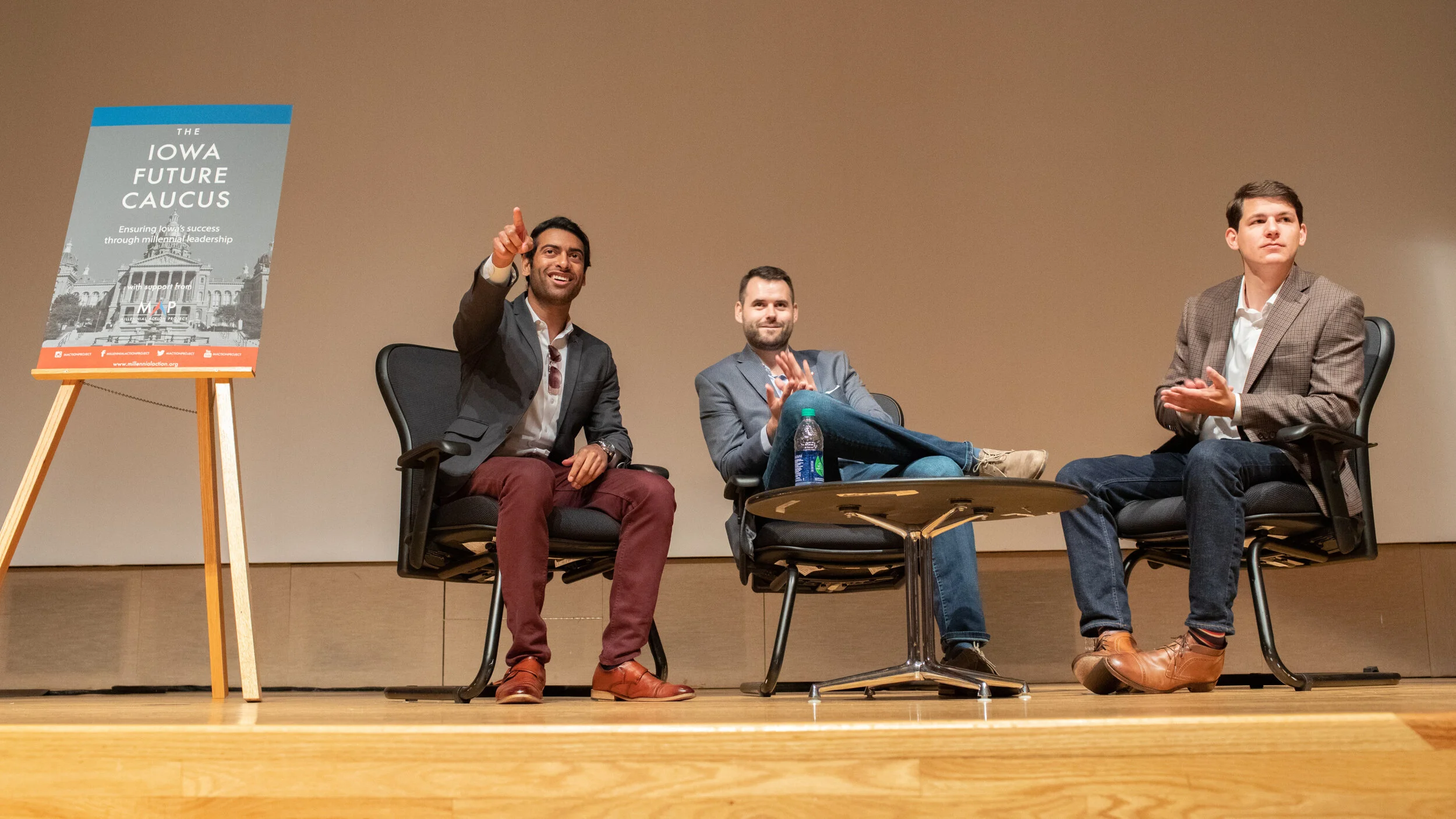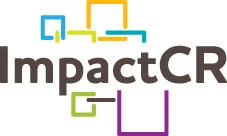The Millennial Action Project, the largest nonpartisan organization of millennial elected officials in the U.S., awarded young state lawmakers from across the country for their work to bridge partisan divides in American politics.
Vote By Mail is a Priority for Bipartisan Iowa Future Caucus to Slow COVID-19
The youth earthquake is just beginning
Olikara recounted how just last week a group of young elected leaders in Iowa came together across party lines to release a series of online videos through social media, aimed at motivating fellow millennials to vote and participate in other ways. It is but one among many examples of young people around the country standing up for our democracy, and reaching out to their peers.
Voters in Senate battlegrounds back early voting, adding pressure on GOP
Because the process will be new to many Iowans, the Iowa Future Caucus, a bipartisan coalition of young members of the General Assembly, launched a campaign this week to promote it.
Meet the young lawmakers crossing party lines for a green future
'Reds' and 'Blues' find common ground in Iowa City
Iowa lawmakers discuss today's political climate with area young professionals
CEDAR RAPIDS, Iowa (KCRG) Iowa lawmakers and local organizations said the current political climate in Washington is “bitter” at an event on Wednesday.
The event, hosted by ImpactCR at the Cedar Rapids Public Library, was aimed at discussing the topic with area young professionals. Speakers said what they've heard from young people is that what they care about most in politics is republicans and democrats working together to get things done, however, we haven’t seen that as much in today’s politics.
Young Professionals Group Hosting Two Iowa Legislators to Discuss Finding Bipartisan Policy Solutions in Today's Political Climate
ImpactCR will host two members of the Iowa legislature who are working to solve conflict and find middle ground in today's bitter political climate. Senator Zach Wahls (D-Coralville, pictured below, left) and Representative Joe Mitchell (R-Mount Pleasant, pictured below, right) will be discussing their participation in the Iowa Future Caucus - a group of the state’s youngest lawmakers dedicated to reaching bipartisan policy solutions addressing issues faced by millennials and future generations. This event will be held on November 13 from 11:30 a.m. - 1:00 p.m. at the Cedar Rapids Public Library at 450 Fifth Ave SE. Click here to register now.
Young members of Iowa legislature form bipartisan caucus
DES MOINES — Senators Zach Nunn (R-15) and Zach Wahls (D-37) and Representatives Lindsay James (D-99) and Joe Mitchell (R-84) announced the creation of the Iowa Future Caucus, a brand-new caucus comprised of legislators age 40 and under.
The announcement is part of a nation-wide movement in statehouses across the country where Millennial legislators are seeking to find common ground in an era of hyper-partisanship. With the launch, Iowa becomes the 28th state to join Millennial Action Project’s national State Future Caucus Network.
Iowa Future Caucus will be part of the Millennial Action Project’s national effort to support young elected officials as they work to break through partisan gridlock and reestablish political cooperation.
“When young legislators put party lines aside and come together to create bipartisan solutions to major issues, the possibilities are endless. It is amazing to see the State Future Caucus Network continue to grow across the nation,” said Steven Olikara, founder and president of Millennial Action Project. “Thank you to Senators Nunn and Wahls and Representatives Mitchell and James for leading this movement in Iowa.”
While there has been a great deal of attention directed at dysfunction and gridlock in government, there is a counter-movement underway — led by Millennials — that seeks to disrupt the status quo in government. Millennial Action Project hopes that as additional younger state legislators course a path of bipartisanship and cooperation, they will be able to bring this perspective to Washington. Currently, 15 Millennial members of Congress began their legislative careers in state houses.
Nunn said he was honored to serve as co-chair.
“As we look toward the future, we need to ensure an ongoing bipartisan dialogue to better address the issues facing young Iowans, generational Iowans, and the future of Iowa,” he said. “The opportunity to collaborate on issues ranging from quality of life, first-time homeownership, broadband expansion, educational investment and career readiness will ensure Iowa is delivering world-class opportunities for every community in the Hawkeye State.”
Mitchell said collaboration across party lines is crucial to ensuring common ground is found on issues facing Millennials.
“It is an honor to co-chair the Iowa Future Caucus with Sens. Nunn and Wahls and Rep. James,” he said.
, “and I look forward to fostering bipartisan dialogue among young legislators.”
Young leaders need to encourage others to become involved in the democratic process, James said.
“We need to work together,” he said, “across party lines, on issues that impact the lives of young Iowans in a positive way.”
Iowa’s youngest legislators form Future Caucus
DES MOINES — Iowa’s younger lawmakers are forming a millennial caucus to work across party lines to break partisan gridlock and address issues important to their generation today and in the future.
“We’re really committed to trying to figure out what are the issues that aren’t yet being talked about, that aren’t yet partisan, and how we make progress on those issues,” freshman Sen. Zach Wahls, D-Coralville, the youngest member of the Senate at age 27, said during the launch of the Iowa Future Caucus at the Capitol on Wednesday. “For us, these are not just issues that are going to be off in the future. 2050, for us, is not really that far away.”
He was joined by his three co-chairs Rep. Lindsay James, D-Dubuque, Rep. Joe Mitchell, R-Mount Pleasant, and Sen. Zack Nunn, R-Bondurant, as well as Sen. Zach Whiting, R-Spirit Lake. James, Mitchell and Whiting are freshmen legislators.
The Iowa Future Caucus is part of the Millennial Action Project, a nonpartisan 503c organization trying to launch a movement of young legislators who believe in transcending partisanship. Iowa is the 28th state to join the project’s State Future Caucus network, a bipartisan group of legislators 40 and younger.
The average age of Iowa legislators is 54.8, with ages ranging from 21 to 78. The caucus members said there are six senators and about a dozen representatives under 40.
Mitchell joked that at 21 he’s really Gen-Z rather than a millennial but said he is happy to be a part of the Future Caucus.
“This is one of the biggest things I’ve thought about in my time at the Capitol,” said Mitchell, who worked four years at the Statehouse before being elected in 2018. It seemed that working with the “other side” was frowned upon, he said.
“That’s wrong,” Mitchell said. “The way we get back to making this country what it was supposed to be is if we can get along, if we can come together and have discourse with each other. This is a great way for people to be able to come together. I can call Zach and Lindsay my friends and they’re Democrats. That’s OK.”
The millennial generation generally refers to people born from 1981 to 1996, and Generation Z to those born from 1997 onward, according to the Pew Research Center.
“In order to find common ground we have to ascend to higher ground,” said James, 38, who added that there are too many barriers to legislators working together.
Nunn, 39, the oldest member of the caucus, noted that 88 percent of bills passed by the Legislature last year had bipartisan support.
“We’re not treading new ground, but trying to grow where there already is fertile ground,” he said.
The Iowa co-chairs said growing Iowa’s population and reversing brain drain are priorities for them.
From Rep. Joe Mitchell
Legislative Update
This week was a busy week here at the Capitol. I was able to meet with constituents visiting the Capitol, vote on essential Judicial Nomination Reform, and speak on the House floor recognizing Black History Month. Needless to say, I am in the full swing of things here in Des Moines and I am proud of the legislation that is being moved forward for the State of Iowa.
I met with the Access Energy Cooperation this week at the Capitol. It is always a pleasure to meet and hear about issues that are important to them.
The Future Caucus
This week, I announced the creation of the Iowa Future Caucus, a brand-new caucus comprised of legislators age 40 and under. The announcement is part of a nation-wide movement in state houses across the country where Millennial legislators are seeking to find common ground in an era of hyper-partisanship. With the launch, Iowa becomes the 28th state to join Millennial Action Project’s national State Future Caucus Network.
As the Co-Chair of The Future Caucus, I plan on focusing on issues that Millennials care about. Iowa’s Future Caucus will be part of the Millennial Action Project’s national effort to support young elected officials as they work to break through partisan gridlock and reestablish political cooperation.
I believe that collaboration across party lines is crucial to ensuring we find common ground on issues facing Millennials. It is an honor to co-chair the Iowa Future Caucus with Senator Nunn, Wahls and Representative James, and I look forward to fostering bipartisan dialogue among young legislators.
This week, I met with Henry County Sheriff Rich McNamee at the Sheriffs and Deputies Reception of Iowa. The Sheriff and I talked about several top priorities of law enforcement and ways to effectively keep Iowa citizens safe. The Sheriff and I joined other law enforcement officials from Iowa to discuss issues within the criminal justice system and law enforcement concerns.
Judicial Nomination Reform
After hearing from constituents and other experts, I have decided to support HSB 110. The current system used in Iowa to place judges and justices on the bench is a merit-based system commonly referred to as the “Missouri Plan.” Under this system, Iowa has 14 district court commissions and a state commission. These commissions select nominees to submit to the Governor to fill judicial vacancies. For the Supreme Court, 3 nominees are given to the Governor; for district court vacancies, 2 nominees are advanced. The Governor must select one of these nominees within 30 days of receiving it. If the Governor does not make the selection within 30 days, the Chief Justice of the Iowa Supreme Court makes the selection.
Several states that have used the Missouri Plan are now debating changes. Tennessee has totally moved away from this plan, and even Missouri is considering changes. The legislation being considered in Iowa would give more voice to the people through their elected officials, regardless of political party.
Why is change necessary? In the current system, attorneys are electing other attorneys with no oversight or accountability to the people. It has also become clear that very few attorneys are participating in the process. In 2018, over 7,000 lawyer members of the bar were eligible to vote for commissioners. Only 18.45% of attorneys eligible to vote actually voted and participated in the process. This means that less than .05% of the people of Iowa, those being attorneys, had a voice in this part of the process.
The changes to the judicial nomination process being considered in HSB110 would result in greater transparency, greater accountability to the citizens of our state, improves the integrity of the system through a more public process, removes the potential of undue influence or pressure resulting from a Judge or Justice being Chair of a commission, all while maintaining a strong attorney presence and the merit system of selection. Our system works best when the power resides with the people, as envisioned by our Founders. HSB110 would return a measure of power to the people in the selection of judges and justices.
I hope you can join me in support of this bill for the various reasons above.
This week I spoke on the House floor for Black History Month. I shared the story of a constituent from Mount Pleasant, Ken Brown.
Looking Ahead
In the next few weeks, I plan to continue holding subcommittee meetings for bills that I believe will improve the lives of Iowans. One of those bills is House Study Bill 148. This is a bill that permits the sale of mixed drinks with hard alcohol at wineries. Currently, wineries are prohibited from selling hard alcoholic mixed drinks and are limited to beer and wine. My colleagues and I decided to support this bill on two grounds. First, this will generate more revenue for small wineries across Iowa, putting more money into local economies. Second, it will generate more tax revenue, with little to no opportunity costs. I feel this a great opportunity to support local Iowa businesses.
In addition to holding subcommittee meetings, I am looking forward to meeting with more constituents both here at the Capitol and at home in the district. Feel free to follow my Facebook page for more updates throughout the week!














